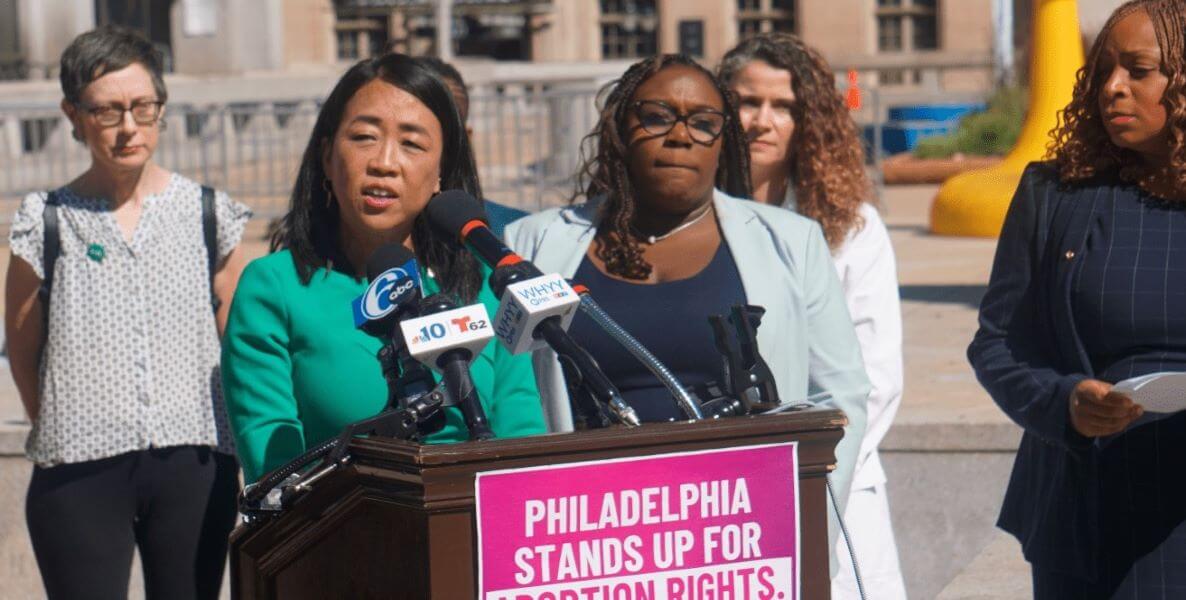Last Thursday, the Philadelphia City Council had its first legislative session of the season. One of the highlights was the Reproductive Freedom Platform, a trio of bills introduced by Councilmembers Kendra Brooks, Helen Gym, and Jamie Gauthier to protect abortion rights.
This was well-intentioned, but it follows a recurring trend in City Hall where our local elected class, bereft of ideas to fix the local issues they were elected to address, play national politics.
Philly can’t regulate abortion
First, a word on what the Reproductive Freedom Platform would do: Gauthier’s bill would allow patients and abortion providers who are the subjects of “vigilante” lawsuits related to reproductive healthcare decisions to counter-sue. Gym’s bill would prevent medical professionals from disclosing whether a patient has had an abortion. Brooks’ bill would restrict an employer’s ability to discriminate against staffers who had an abortion. The hitch is that whatever effect these bills will have will be minimal.
When Councilmembers misrepresent the power of their office, they intensify civic illiteracy.
The Councilmembers’ worst-case scenario is that Pennsylvania bans abortion. If that happens, doctors will stop performing them. Under the state’s Abortion Control Act, doctors are required to report abortions to the state Department of Health. The penalty for failing to report is suspension or termination of your medical license.
Abortion providers are unlikely to defy a state ban, risking their licenses. Instead, they will shutter their doors, as seen in other states that already banned abortion, like Indiana, Texas, Arizona, and Tennessee. Council passing these reproductive health bills would not prevent that from occurring. This is a fight for the state legislature and the new governor — not City Council.
While this abortion legislative package is a more benign stretch of Council’s authority, it’s still beyond City business. The priorities of a municipality are to ensure the cleanliness of neighborhoods, manage land and development, maintain a balanced city budget, regulate parking, and the like. But more and more, you see Councilmembers making their bones from nationalizing local politics. Meanwhile, there’s a housing crisis, prevalent short dumping, and potholes shifting car alignments. There are a plethora of local issues that demand their attention.
Why councilmembers play national politics
Still, the benefits of playing national politics are alluring. It garners more press and social media fame, grabs the attention of progressive PACs, and, most importantly, makes it look like they’re doing their jobs. If you ignore non-city-related legislation, Council session agendas start looking much lighter, revealing their lack of productivity on local issues. To hide this, they introduce a flurry of toothless bills and resolutions.
Aside from needing to mask unproductiveness, the obsession with national politics is also the fruit of campaigning. These politicians spend their entire careers instilling public faith in their candidacies by telling constituents they can fix whatever issue they have. And after all that politicking and campaigning, they begin believing their own spin. So, when their advisors tell them something’s outside their authority, they react as if they’ve been neutered. (I speak as an ex-Council staffer here). While preoccupied with stroking their own egos, unintended consequences surface.
More and more, you see Councilmembers making their bones from nationalizing local politics. Meanwhile, there’s a housing crisis, prevalent short dumping, and potholes shifting car alignments.
The natural consequence of local electeds posturing on national issues is that constituents start getting the impression that it’s actually part of their role to handle those national issues. Having worked in multiple Council offices, I fielded many inquiries asking Councilmembers to handle matters outside their purview. I dealt with requests ranging from urges to enact universal healthcare to calling on Congress to eliminate nuclear weapons. It goes without saying — except that this subject obliges me to say it — that Council can’t do either of those things. People know very little about how their government works and what different parts of government can address. When Councilmembers misrepresent the power of their office, they intensify that civic illiteracy.
The staggering number of people who think Council has more power than it does causes a real hassle for Councilmembers’ offices because constituents are demanding them to do what they cannot do. But Councilmembers do it to themselves by monopolizing their legislative agendas with national politics, creating false perceptions about their authority. The most pervasive example of this is gun control.
What Council can and can’t do
Council can’t do squat about the proliferation of guns. Sure, they can lean on the Police Department and the District Attorney to reduce the pervasiveness of illegal firearms. But what Councilmembers can’t do — despite the national rhetoric they want to get behind — is enact gun control. State law preempts municipalities from legislating that issue in a clause that reads, “No county, municipality, or township may in any manner regulate the lawful ownership, possession, transfer, or transportation of firearms.”
What they can do — what they should do — is lead the fight to end gun violence through proven methods that take coordination and political will. But that’s hard; easier is suing the Commonwealth of Pennsylvania, attempting to gain regulatory authority over guns, and giving speech after speech about there being too many guns on the street and the need to “do something.” In the end, that helps no one.
If Councilmembers want to legislate guns, abortion, Ukraine, and the rest, they ought to run for Congress or the General Assembly. Until then, focus on City business.
Correction: A previous version of this story misstated what Councilmember Gauthier’s bill would do. It would allow patients and providers who are subjects of lawsuits related to reproductive health care to counter sue.
Jemille Q. Duncan is a public policy professional, columnist, and Gates Scholar at Swarthmore College. He is the former aide of two Philadelphia City Councilmembers and a Pennsylvania State Senator.
![]() MORE ON LOCAL GOVERNMENT FROM THE CITIZEN
MORE ON LOCAL GOVERNMENT FROM THE CITIZEN



